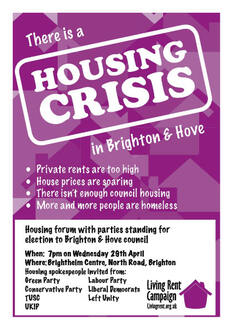-
Stop CJ Hole exploiting the housing crisis in BristolAn estate agent in Bristol called CJ Hole has been sending out letters to its landlord clients asking "Are you getting enough rent?" and "How do you get more rent?" The letter they are sending to landlords explains that "with rents increasing every week in Bristol, it is highly likely your property is due a rent increase.” It goes on to say that “the demand from tenants is far exceeding the number of available properties and we have never seen such a buoyant rental market." It doesn't once mention the rights of tenants. The letter shows how some estate agents and landlords are seeking to cynically profit from the housing crisis in Bristol at a time when inflation has declined to 0.3% and deflation is predicted. I think there is no justification for increasing rents at a time when prices are actually going down. In addition, real average earnings have fallen by 8% since 2008. Such predatory rental practices are an attack on low income people and threaten the most basic of rights – the security of a home to live in. Bristol's housing supply has been described by an official report as "in crisis." In 2013 just 60 affordable homes were built across Bristol Please sign this petition if you want CJ Hole to stop sending these letters to its landlord clients and if you want your next MP to support rent controls, giving more rights to tenants and building more affordable homes. If you have experienced a rent rise you believe is unjustified please post the details below. I.e. how much was it, was it in response to improvements made by the landlord, and any other points you think are relevant. If you have seen similar letters from other estate agents, please contact me. We will compile a list of all responses and use these as the basis for a later action/petition. Read the full letter below: https://s.bsd.net/38degrees/main/page/-/11096902_10153147467450900_147746140_n.jpg13,104 of 15,000 SignaturesCreated by Nathan Williams
-
A call for fair private rents, new social housing and secure tenanciesEveryone needs a decent secure affordable home in which to flourish. We therefore call on Brighton and Hove Parliamentary candidates to campaign for the following changes, and to vote for them if elected: • Bring back fair rents - a “Living rent” (achieved by rent controls) • Protect private tenants with long secure tenancies • Institute registration of all private landlords to ensure minimum standards of fire safety, energy efficiency and a decent home standard for private housing • Abolish the Right to buy and lift borrowing ceilings and restrictions so councils can again build social rented housing • Link rents policy to affordability not the market • End discrimination against tenants on benefits3,118 of 4,000 SignaturesCreated by diane montgomery
-
Respect for TenantsThis must affect a large number of tenants in the UK and they have no way of resolving their issues, other than using very expensive commercial Lawyers1 of 100 SignaturesCreated by Thomas Okeefe
-
Cap private rents in CornwallPaying extortionate rent in a time of a cost of living crisis is totally unacceptable.4 of 100 SignaturesCreated by Peter Fox
-
Allow mansards in Islington conservation areasOur conservation area policies are over 20 years old, from when house prices were one sixth of today’s level and climate less revelant. Islington now has a clear problem with families leaving the Borough, with the Local Plan evidencing high resident turnover and the number of primary school pupils in decline. Mansards have a clear role in creating space for families or additional flats, whilst also serving as a tool to improve energy efficiency (improved insulation, solar). These needs have been recognised for 50% of the Borough which sits outside conservation and they should be recognised for the rest. This petition is only open to those living, working or studying in the Borough.46 of 100 SignaturesCreated by Keval Khiroya
-
Local Housing Allowance must Match Housing Costs and NeedsIf you are privately renting and on benefits you will be able to claim Local Housing Allowance (LHA), the problem is that unless you are very lucky it won't cover your rent. Sometimes this is because where you live has been banded with another area where housing is cheaper. The fact that your area, even it is in another town, has higher rental prices won't affect how much you get. The immediate effect is that you will be paying the difference between your allowance and rent out of your other benefits. This means that even if you are disabled and have certain requirements like being on the ground floor, need wheelchair access or need friends or relatives to visit you every day, you are massively disadvantaged by this system. Just imagine if your relative needed your help everyday but couldn't get it because they couldn't afford to live locally or you couldn't find a home that meant you could live independently? If you lived in my town you would receive over £230 less than another town which is just under 4 miles away and is in fact in the same band as another town which is just over 9 miles away. This doesn't make sense does it? This is called the Broad Rental Market Area and it doesn't reflect actual housing costs. Where I live it costs more to rent than in either of these areas! I am asking that you join my campaign to have the local housing allowance banding overhauled and made to reflect local housing costs. This will help people who are already vulnerable, living on benefits and having to pay more for their rent than the current system acknowledges. I am also asking that the LHA does take into account disability needs - currently it does not. Please don't say: It will only go to property investors. Do say: Ask the goverment to make it work fairly.5 of 100 SignaturesCreated by Christine Richardson
-
Mortgage Accessibility for Private RentersThis issue affects everyone. Everyone that is renting a home but doesn't want to. Everyone who is struggling daily, weekly and monthly to get by. Everyone with 2/3/4 jobs just to make ends meet. The people in power don't see this issue because they are not living paycheck to paycheck. They don't understand the stress of paying rent every month for years on end and having nothing to show for it at the end of the day. Or the stress of never feeling secure in your home incase your landlord sells from under you. It's looking after the rich and exploiting the poor, and nowadays, everyone is poor.37 of 100 SignaturesCreated by Brogan Stewart
-
Standing up to Gentrification housing inequalityThis petition is of great importance, as it will look deeply into certain problems which have derived from affordability issues within housing policy and gentrification surrounding the housing market. The petition focuses upon the issues gentrification brings to lower income communities and aims to form a new way of going about affordable housing policy. The revision of the 106 agreement as well as gentrification activism are at the heart of this petition in attempts to fight of issues with national policy and greedy developers!15 of 100 SignaturesCreated by Jack Callaghan
-
Stop landlords rejecting people with petsThere is a massive problem with people trying to find private renting properties due to fact of having pets, mainly dogs which is very unfair. A lot of dogs can treat a house more respectfully than children, so why should people with dogs be rejected? Landlords take a deposit at the start of a tenancy so I don't see why we should still be getting rejected. I know it's said that landlords can not discriminate against pet owners but if, say, two people go for a house - one with dogs and the other without - the landlord can still choose the person without dogs as they don't want pet owners in their properties. The estate agent always asks if you have any pets at the start of the application and I don't think this is right. Many people become homeless due to not being able to rent as they have pets. People should join this campaign as I know there are so many people in this situation and something needs to be done about it to make it fair for those struggling to find a rented property12 of 100 SignaturesCreated by Natasha Thraves
-
Years worth of successful rental payments in place of mortgage deposit.It’s important because whilst the price of everything is going up, incomes and salaries are not going up at the same pace. It is getting harder and harder for young people to get onto the property ladder all whilst there is a shortage in rental accommodation. Making it possible for people to get onto the property ladder by proving they can pay a larger amount every month successfully through rent, would improve so many peoples quality of life.50 of 100 SignaturesCreated by Ellie Lewis-Wood
-
End the Secrecy: Full Transparency for all HHGE Service Charges(1) Over the last 10 years over £3 million+ been spent on the upkeep of the common parts of the Hanger Hill Garden Estate Flats Hanger whilst the fabric of the buildings and the gardens has steadily deteriorated. (2) We want to know where the money was spent by whom and on what ?4 of 100 SignaturesCreated by quentin phillipps
-
HOUSING REFORM; A STATUTORY BODY IS NEEDED TO UPHOLD & PROTECT HOUSING ASSOCIATION TENANTS RIGHTSIt was not by the “authority” of the Housing Ombudsman; of which I am sure - most if not all of the tenants in the recent and shameful scandal over disrepair and living conditions (deemed adequate and suitable) will have happily been directed to by the relevant Housing Association’s that came under scrutiny; but rather it took exposure to damning Public outcry, vilification, shaming, and the WEIGHT of the gathering, and unfavourable Press to compel these deafened and autocratic Housing Associations to un-trench themselves, and act with decency; eventually withdrawing and retracting THEIR OWN shameful “self-determinations”. Equally NO politician, or local MP forced them to address this long-standing and indolent contradiction prior to this. Being unlikely to be victims in their OWN properties of mould (exacerbating health conditions), damp, fire hazard, and electrical disrepair; and not being subjected to living in these conditions (or similar) on a daily basis, - indolently encouraging YOU, to be patient, in THEIR enquiries, in absence of any degree of empathy, urgency, or understanding appearing to be forthcoming. In the absence of any impetus, enthusiasm, or motivation from our elected officials; our “representatives” indolently deeming the current framework for dispute resolution (the “broken” system that WE are THE VICTIMS of any failures or shortcomings in) as “adequate” and “fit for purpose”; out of a need for MORE robust, balanced, and EQUAL representation, and in the absence of any consideration, or concern on this matter being extended by our locally elected officials and MP’s. I urge and encourage ALL Housing Association tenants that have been, or remain dissatisfied with their treatment and experience from their Housing Association; frustrated and fed-up with the lack of interest or concern demonstrated by paid and elected officials expected to represent and look after OUR interests, to take this opportunity to rally together, make a difference to your treatment, – as vulnerable cash cows having no secure tenure, and sign my on-line petition for this long-overdue housing reform; add your voice (your tenancy), and rebuke your treatment, we need 100,000 signatures to bypass our MPs ourselves, and our struggle to be finally taken notice of and debated in Parliament, calling for the IMMEDIATE forming of a STATUTORY body to represent OUR interests - the average tenant. https://twitter.com/letdownbyMPs https://www.facebook.com/groups/59364328493540722 of 100 SignaturesCreated by Derrick Palmer
Hello! We use cookies to improve your experience by providing insights into how the site is being used. Find out more.


